Hotel Management Software – An Intuitive & Easy-to-Use Solution for Every Property
Vietnam’s hospitality industry is entering a strong growth phase. According to the national statistics, thousands of new lodging facilities are opened every year, from small homestays to high-end hotel chains. Intense competition means that just one delayed check-in or a mistaken booking can result in negative reviews and lost customers.
In this context, relying on manual records or Excel files to manage rooms, bookings, and financial reports is outdated. Staff waste hours on data entry, customers endure long check-in/out times, and managers lack visualized data to make decisions.
👉 This is when hotel management software with an intuitive interface – simple workflows – easy usability becomes the key. It not only solves “operational headaches” but also creates a sustainable competitive advantage: faster – more accurate – more professional service.
📌 See also: CIT Hotel – A comprehensive solution for modern hospitality
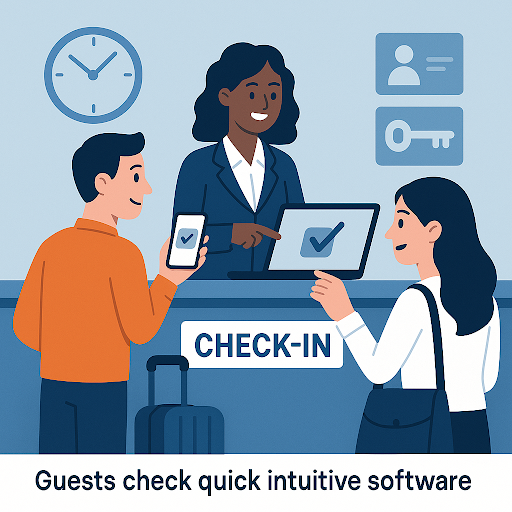
Why do hotels need easy-to-use management software?
Software with many features but difficult to use is like a luxury car that staff don’t know how to drive. In practice, 85% of front-desk staff and hotel managers prioritize “ease of use” over “more features” (Hospitality Tech 2023). When handling hundreds of bookings a day, speed and simplicity determine efficiency.
Problems without intuitive systems
- Time-consuming training: new staff take weeks to learn, slowing onboarding.
- Data-entry mistakes: cluttered UI leads to wrong rooms, double bookings.
- Guest delays: complicated check-in/out frustrates customers.
- Lack of visual, real-time data: managers cannot track room status instantly.
Benefits of intuitive & easy-to-use software
- Quick onboarding: new staff adapt within 1–2 sessions.
- Error reduction: clear workflows minimize mistakes.
- Better guest experience: fast check-in/out leaves a strong first impression.
📊 Hospitality Tech 2023: 81% of guests value hotels with quick check-in and professional staff operations.
Highlighted features – Easy to use, intuitive & simple
Modern hotel software must be powerful yet friendly to users.
1. Intuitive interface
- Minimalist design, clear modules: booking, housekeeping, front desk, accounting.
- Icons and colors for easy recall; no need to memorize complicated steps.
- Dashboard overview: room status, occupancy, revenue.
2. Simple workflows
- Booking & check-in/out in just 2–3 steps.
- Real-time housekeeping updates.
- Contextual action buttons minimize mis-clicks.
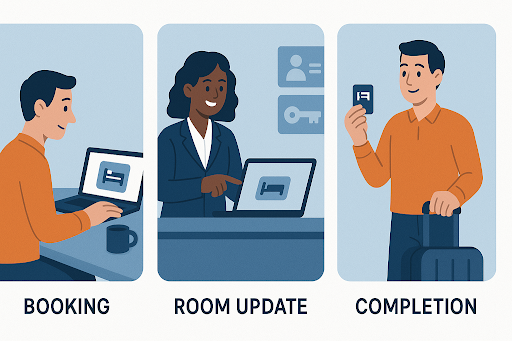
3. Easy for every staff member
- New staff can get started after short training.
- Friendly language; supports Vietnamese & English.
- Detailed documentation & videos reduce IT dependency.
→ This difference makes hotel software not only operationally effective but also saves training time and raises staff productivity.
Benefits of deploying intuitive & easy-to-use hotel software
For hotels
- Reduced operational errors thanks to a clear UI.
- 30–40% less training time.
- Up to 50% faster check-in/out.
- Transparent data & reports for faster decisions.
For guests
- Fast, simple check-in.
- Professional service with less waiting.
- Higher satisfaction → more returns & better OTA reviews.
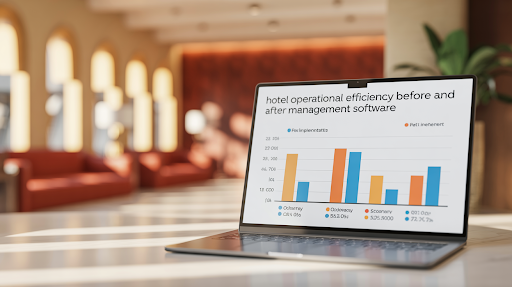
Hotel management software vs Excel
Excel used to be the “go-to tool” for small hotels, but as room count and guests increase, Excel shows clear limits. The comparison below shows why modern hotels switch to professional software.
| Criteria | Excel hotel file | Hotel management software |
|---|---|---|
| Initial cost | Almost free | Upfront investment, long-term optimization |
| Room/booking management | Manual updates | Real-time synchronization |
| Reports & analytics | Manual, error-prone | Automated, visualized |
| Guest experience | Slow check-in/out, easy to mix up | Fast, smooth, professional |
→ Excel is like a motorbike for short trips. For sustainable growth, hotels need a “car” — professional management software.
Hotel software cost – influencing factors
Cost is often a barrier. In reality, the initial investment helps save long-term expenses and increase revenue. There is no fixed price; it depends on features, deployment platform, scalability, and security needs.
1. Number & complexity of features
- Basic: booking, housekeeping, guest management, income/expense reports → suitable for small hotels or homestays; lower cost.
Advanced features:
- OTA connections (Booking.com, Agoda, Traveloka).
- Online payments (Momo, VNPay, credit cards).
- Multi-branch chain management.
- Revenue Management reports, occupancy forecasting.
- Online/self check-in via QR or kiosks.
→ These require more development, integration, and testing time, so costs are higher.
Real example: A 20-room homestay may only need basic features (~20–30 million VND). A 3-star hotel with 100 rooms requiring OTA + accounting + CRM + guest mobile app → cost can be 3–4× higher.
2. Development platform (Web, Mobile, Multi-platform)
- Web App: quick deployment for internal use via browser — lowest cost.
- Mobile App: for remote management or guest self check-in — useful for 3–5 star or chains.
- Multi-platform (Web + iOS + Android): highest cost but end-to-end experience — typical for large chains.
Example: A boutique hotel in Da Nang chooses Web App only → cost is ~40% of building an additional mobile app.
3. Scalability and security
This is crucial but often overlooked.
- Scalability: flexibility to add branches or modules (CRM, accounting, loyalty program) later.
- Security: sensitive data (passports, credit cards) → compliance with ISO 27001, GDPR, PCI DSS.
👉 Message: Don’t view software cost as “expense”; it’s an investment in revenue, brand, and long-term growth.
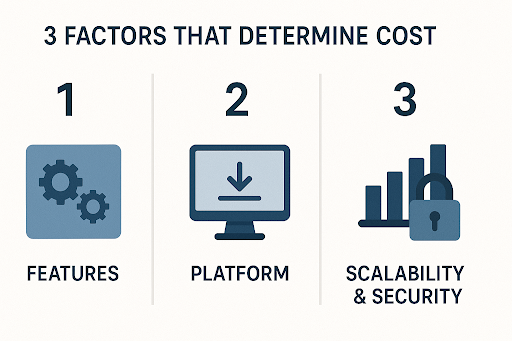
Deployment process at TheApp4U

Survey & Requirements
- Work directly with owners and departments (front desk, housekeeping, accounting).
- Capture current processes and pain points.
Analysis & Planning
- Define feature scope.
- Estimate timeline and cost fitting the budget.
UI/UX Design
- Simple, easy-to-read screens for non-IT staff.
- Present demo for client feedback.
Development & Integration
- Core features (booking, housekeeping, reporting).
- Integrate OTA, CRM, payments as required.
Testing & Deployment
- Test on simulated data.
- Pilot at the hotel for 1–2 weeks.
- Official go-live.
Training & Post-deployment Support
- Train front desk and managers.
- Provide documents/videos; 24/7 technical support.
Commitments & Support
- Training & knowledge transfer from day one.
- 24/7 technical support via hotline/email/ticket.
- Warranty & maintenance 12–36 months (by package).
- Upgrades & expansion for new branches.
- Security & tech updates to latest standards.
⇒ With TheApp4U, you’re not just buying software — you’re gaining a strategic tech partner.
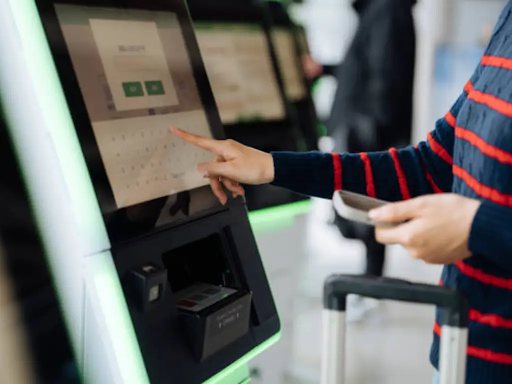
Integrations & Future roadmap
Main directions:
- OTA integrations: Booking, Agoda, Traveloka.
- Connections to CRM, accounting, marketing systems.
- AI Pricing & Revenue Management.
- IoT for room/equipment monitoring.
⇒ Helping hotels stay one step ahead in digital transformation.
FAQ
1. Is the software really easy to use?
Yes. Intuitive interface, 2–3 step check-in/out, buttons aligned to front-desk habits. Staff can adapt on day one instead of weeks.
2. Is a lot of training required?
No. Typically 1–2 focused sessions:
Session 1: overview, booking, check-in/out.
Session 2: housekeeping, revenue reports.
Extra online sessions for multi-shift hotels if needed.
3. Multi-device support?
Yes. PC for front desk; mobile for managers; tablet for housekeeping with instant updates.
4. What does it cost?
Depends on features (e.g., OTA, payments, CRM), platform (Web/Mobile), and scale (single property vs chain). Basic packages start from tens of millions VND; chain solutions higher. We tailor to actual needs.
5. Is guest data secure?
Yes: end-to-end encryption; fine-grained permissions; scheduled backups; compliance with ISO 27001, GDPR, PCI DSS.
6. How long does deployment take?
Basic (booking/housekeeping/reporting): 2–4 weeks.
Full solution (multi-branch, OTA, CRM, payments): ~6–8 weeks.
Process includes survey → configuration → testing → training → go-live to avoid service disruption.
Commitment from TheApp4U
At TheApp4U, we deliver intuitive, easy-to-use hotel software with 24/7 support so your operations run smoothly without disruption. 👉 Contact us today for free consultation & live demo.


 English
English
 Tiếng Việt
Tiếng Việt
Add New Comment